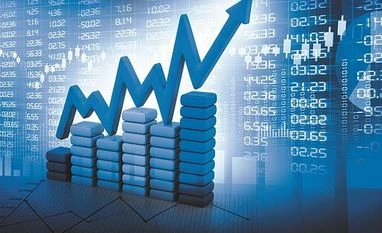The Monetary Policy Committee (MPC) will gauge weakening macroeconomic parameters like surging inflation, subdued industrial growth, and widening trade deficit to take a call on the policy rate in its three-day meeting commencing July 30.
Economists say it will be a tough decision to make. Some say the MPC will raise the rate, while others are of the view that there is already de facto interest rate tightening through rising bond yields, which might prompt the central bank to go for a pause.
If one looks at the data — growth in the Index of Industrial Production (IIP) slowed down to a seven-month low in May, Consumer Price Index (CPI)-based inflation rose to a five-month high in June, Wholesale Price Index (WPI)-based inflation jumped to a four-year high, and the trade deficit widened to a five-year high in June -- it becomes clear that any rise in the rate will further slow down economic growth, while holding the rate will not allow inflation to come down.
There are expectations that the current account deficit (CAD) might rise to 2.5 per cent of GDP in the second quarter, from 1.9 per cent, on widening trade deficit. Economists also expect the RBI to cut its projections of growth in the gross value added (GVA) from its current prediction of 6.7 per cent for the current financial year. It had already cut it from 7.3 per cent in its June review.
“My sense is that the MPC might hike rates," former chief statistician Pronab Sen said. He said the impact of the MSP hikes on food inflation depended on how much the government would actually procure. “If it procures just to meet its commitments (PDS and mid-day meal), then the impact will be around 10 basis points on the food inflation. But if it procures more than that, then the impact will be larger,” he said.
Sudipto Mundle, an emeritus professor at the National Institute of Public Finance and Policy, said, “On balance, I would not hike rates as the real interest rate is already very high.” He agreed that there were upward pressures on prices in the economy, which could push inflation beyond the RBI’s band. Also, he said, the US Fed was raising rates.
ICRA Managing Director and group CEO Naresh Takkar said the MPC would adopt a cautious stance and increase the repo rate by 25 basis points to 6.5 per cent. However, given the lack of clarity regarding some of these risks, it might persist with the neutral stance of the monetary policy, to signal that the timing and magnitude of upcoming rate hikes would be data dependant, he said.
“It’s likely to be the status quo," Devendra Pant, chief economist at India Ratings said. He said global oil prices had stabilised at $72-73 a barrel from the earlier $78 a barrel, the rupee stablised at 68-69 against the dollar, and the impact of increase in the MSP for kharif crops on food inflation would happen only in the second half.
However, he said there were still parts in the country which had received deficient rains. Bihar had 42 per cent deficient rains, Jharkhand 32 per cent, and West Bengal 20 per cent. Also, global central banks such as the US Federal Reserve, the Bank of Japan, and the European Central Bank were hiking interest rates, he said.
“We believe the August rate decision is a close call, though we believe status quo rather than a hike looks the best option,” Soumya Kanti Ghosh, chief economist at the State Bank of India group, said.
The only reason for a rate hike by the RBI at this juncture might be to satiate the self-fulfilling prophecy of market expectations of a rate hike to stem the rupee depreciation, he said.
An economist said on condition of anonymity that an increase in rates was likely to impact economic growth.

Unlock 30+ premium stories daily hand-picked by our editors, across devices on browser and app.
Pick your 5 favourite companies, get a daily email with all news updates on them.
Full access to our intuitive epaper - clip, save, share articles from any device; newspaper archives from 2006.
Preferential invites to Business Standard events.
Curated newsletters on markets, personal finance, policy & politics, start-ups, technology, and more.



)